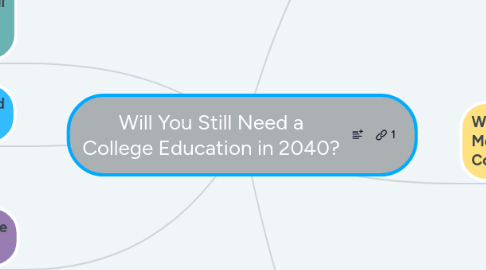Will You Still Need a College Education in 2040?
by Danny Forest


1. Traditional Colleges Will Be Forced to Adapt to Meet the Needs of Employers
1.1. Some students regret going to college, with student loans being the main reason for their dissatisfaction
1.2. Colleges will have to become more focused on employment and employability,
1.3. Now, and likely in the future, employability and return on investment are at the top of the mind for many prospective students.
1.4. Colleges will have to focus on more practical-based training and change their curriculum to meet the demands of employers.
2. We’re Going to See More and More Alternatives to Traditional Colleges
2.1. One of those training paths will be company-sponsored apprenticeship programs
2.2. They are faster and cheaper than colleges
2.3. But many still require the applicants to incur financial risks by paying tuition fees upfront without the guarantee of a job.
2.4. Another version is educational providers who adopt an income-share agreement.
2.5. The problems with employer-sponsored apprenticeships
2.5.1. Not every company can afford to introduce this kind of program.
2.5.2. Also, when a company is in charge of their employees’ education, it locks the employees into a company’s way of doing things
2.6. Craig believes that the sweet spot will be “intermediaries that can build into their business model a commercial incentive to provide, train entry-level talent, and scale.”
3. Soft Skills Will Continue to Be Important, but Most Jobs Will Require a High Level of Technological Competence
3.1. The prevalence of automation will mean that more and more jobs will require an ability to work with new technology.
3.1.1. A job in sales or marketing will require competence in navigating customer management software such as Salesforce.
3.1.2. Nurses and doctors will have to work alongside robots.
4. Specialists Will Be More Valued Than Generalists
4.1. Example
5. Microcredentialing Will Become More Prevalent
5.1. Jobs won't be destroyed but will be changed - people will need to work with an AI bot
5.1.1. People will need to get upskilled and/or reskilled into new industries, and learn new skills if technology destroys jobs
5.2. Workers will continually need to upskill and reskill as employers’ needs shift.
5.3. We’re going to see “small bites” education.
6. Lifelong Learners and Companies That Encourage a Culture of Learning Will Be the Ones to Thrive
6.1. Those who choose to see their careers as a sequence of continuing education will be the ones to thrive in the future.
6.2. As for employers, companies that cultivate a culture of learning will be the ones who benefit.
6.3. Facilitating training will become part of a manager’s role. Direct learning is going to be a core part of that.
6.3.1. Companies are now realizing that to sell their technology, they need to get into the education space.
6.3.2. They realize that they are limited in how much they can grow because there aren’t enough skilled professionals.
